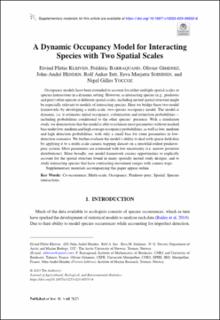| dc.description.abstract | Occupancy models have been extended to account for either multiple spatial scales or species interactions in a dynamic setting. However, as interacting species (e.g., predators and prey) often operate at different spatial scales, including nested spatial structure might be especially relevant to models of interacting species. Here we bridge these two model frameworks by developing a multi-scale, two-species occupancy model. The model is dynamic, i.e. it estimates initial occupancy, colonization and extinction probabilities—including probabilities conditional to the other species’ presence. With a simulation study, we demonstrate that the model is able to estimate most parameters without marked bias under low, medium and high average occupancy probabilities, as well as low, medium and high detection probabilities, with only a small bias for some parameters in low-detection scenarios. We further evaluate the model’s ability to deal with sparse field data by applying it to a multi-scale camera trapping dataset on a mustelid-rodent predator–prey system. Most parameters are estimated with low uncertainty (i.e. narrow posterior distributions). More broadly, our model framework creates opportunities to explicitly account for the spatial structure found in many spatially nested study designs, and to study interacting species that have contrasting movement ranges with camera traps.Supplementary materials accompanying this paper appear online. | en_US |
